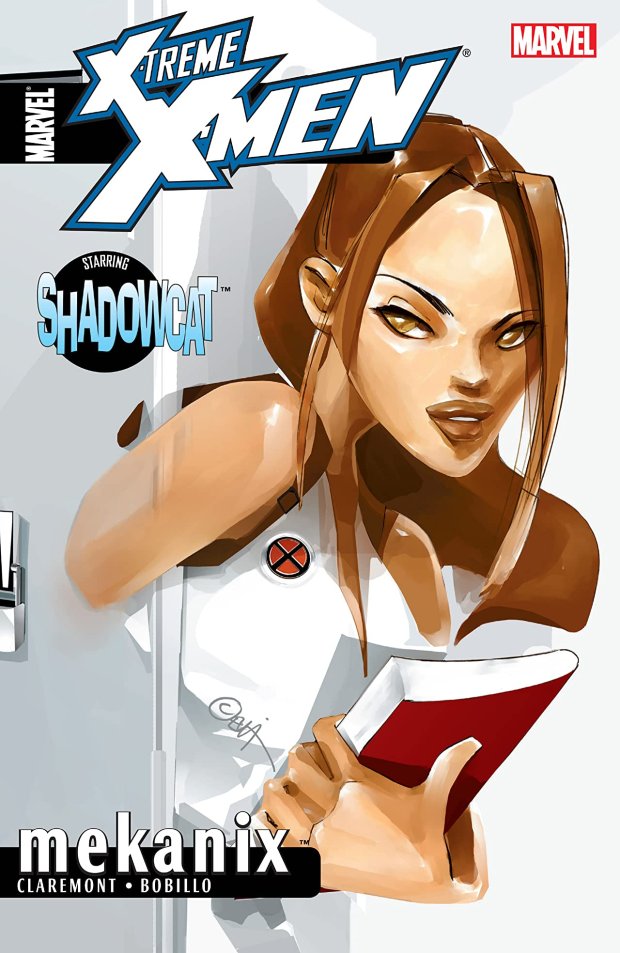by Chris Claremont, Juan Bobillo & Marcelo Sosa
collects Mekanix #1-6
Having a Marvel Unlimited subscription means diving into some older comics! (Wait, does 2001 count as old now? Uuuugh.) In the mysteriously named Mekanix (the title is never explained), Kitty Pryde aka Shadowcat chooses to leave the X-Men and the superhero life entirely. She’s processing some major grief – most significantly losing her dad after the devastation on the mutant island Genosha. Kitty joins a grad program in Chicago, picks up a bartending gig, and makes some new friends, but danger finds a way of following her.
In many ways this is a classic Claremont story, and his affection for Kitty (who he created) is on full display. The anti-mutant “Purity” group that targets mutants (and doxxes them, before there was a term for it), is still depressingly relevant, and a modern version recently popped up in New Mutants. Claremont is never afraid to make the mutant/minorities allegory very clear, and Kitty, who is also Jewish (like Claremont), is a perfect microphone for it. Obviously this will turn off folks, but it’s also what has always made the comics so powerful. (And you can certainly argue that several comics and other properties have forgotten that essential core to the X-Men, but I digress.)
But some things are still pretty off, it’s a combination of the product of its time, and the story as it stands on its own. There’s some cringey, outdated dialogue (particularly from the characters of color) and some dialogue is self-explanatory (Claremont’s signature) too. I appreciate the grief aspect and Kitty going to therapy, but it wasn’t as effective it could have been; we actually learn more about the therapist than any real breakthrough for Kitty. The pacing is also strange. The focus on Kitty, the grad program and Purity (along with Alice, a VERY problematic villain), reaches a high point and then is suddenly disrupted by new and improved Sentinels. I suspect Claremont took the mutant allegory as far as he could and then cut it off for more typical X-Men content. I’m honestly not sure if this is the story Claremont wanted to tell in full, though it was nice to have some action.
Probably the biggest highlight of Mekanix is Kitty’s friendship with Xi’an Coy Manh, also known as Karma, who is living in Chicago with her two young siblings, as well as Shan, a new character. It’s quite obvious that Kitty and Xi’an, who is a lesbian, have a romantically charged moment, and I later learned that Claremont tried to confirm Kitty as bisexual in this arc, but Marvel wouldn’t have it. Thankfully she was finally canonized as queer in last year’s Marauders.
The art is really not my style. Bobillo’s style is too loose, and it didn’t really make me feel like I was reading an X-Men universe book. Kitty is really over-sexualized (also part of comics 20+ years ago, doesn’t mean I have to like it), her midriff is constantly showing even in the middle of a huge scientific experiment – I say this not to be shaming, but because it literally doesn’t make sense practically. All the women are put into gratuitous poses, and her lips look . Also, I’m sorry to say this about the one woman on the book, but Cecilia Calle’s covers are just atrocious. Thank goodness they used this cover even though it’s still pretty bad; they are all sloppy, disproportionate and sexualize Kitty, amping up the objectification to an insane degree.
My time reading Mekanix is worth it because Kitty is one of my favorites and it fills in some gaps. But I wouldn’t recommend for anyone other than Kitty or Karma fans; it’s a disappointing story that doesn’t age well.

She looks like an over-sexualized version of Angelina Jolie in this cover.
Oh no, I’m never going to unsee that! The worst part is this is the least offensive cover…they’re pretty awful.